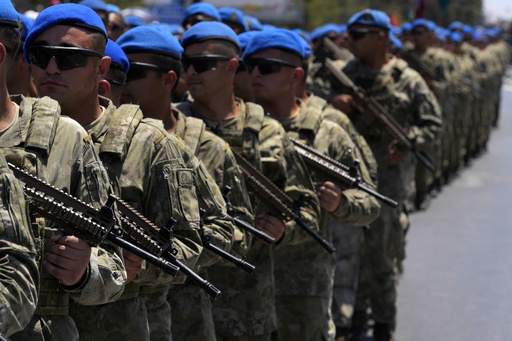NICOSIA, Cyprus (AP) — Turkey’s president on Saturday put a damper on hopes for a quick resumption of talks to heal a half-century of ethnic division on Cyprus, reaffirming his support for a two-state deal that Greek Cypriots dismiss as a non-starter.
President Recep Tayyip Erdogan ruled out a peace deal based on a United Nations-endorsed plan for federation, speaking ahead of a military parade to mark the 50th anniversary of a Turkish invasion that split the island along ethnic lines.
Although Erdogan has previously rejected the federation plan, Greece and the Greek Cypriots had hoped he would soften his position.
The anniversary is a festive occasion for Turkish Cypriots in the island’s northern third, who view the invasion as salvation from the Greek-speaking majority’s domination. The invasion followed a coup that aimed at a union with Greece, which was backed by the junta then ruling in Athens.
In the south, the howl of air raid sirens at daybreak began a solemn day marking what Greek Cypriots remember as a catastrophe that left thousands of people dead or missing and displaced a quarter of the Greek Cypriot population.
Erdogan’s remarks may further complicate U.N. Secretary-General Antonio Guterres’ effort to get both sides back to the negotiating table. His personal envoy, Maria Angela Holguin Cuellar, has spent the past six months scoping both sides out.
“We will continue to fight with determination for the recognition of the TRNC (breakaway Turkish Cypriot state) and the implementation of a two-state solution,” Erdogan told throngs of Turkish Cypriots lining the parade route in scorching heat in the northern half of the divided capital, Nicosia.
“A federal solution in Cyprus is not possible, this is what we believe,” Erdogan said. “The Turkish Cypriot side, as equals with the Greek side, are willing to negotiate and are ready to sit down and negotiate. If you want a solution, you need to recognize the rights of Turkish Cypriots.”
Turkish Cypriot leader Ersin Tatar said Turkish Cypriots reject “domination” by the Greek Cypriot majority and seek “equal national status” for their breakaway state they unilaterally declared in 1983, which is only recognized by Turkey. He added that there’s now “no common ground” for a return to peace negotiations.
Referring to a recent resolution in the Ankara parliament calling for a two-state solution, Tatar said it “will help us and our cause incredibly.”
The island’s Greek Cypriot President Nikos Christodoulides said he remains committed to resuming peace talks to reunify the island as a federation, despite obstacles or even “threats” from Erdogan.
But Christodoulides said he wouldn’t sign up to any agreement that either foresees a two-state arrangement or is unworkable and doesn’t guarantee rights afforded to any other European Union citizen.
Speaking at the same event, Greek Prime Minister Kyriakos Mitsotakis said there’s no other option than to resume talks, an assessment he said was shared by the U.N. chief.
“One who isn’t in the right and has no arguments to make evades dialogue,” Mitsotakis said.
After numerous failed rounds of peace negotiations, many Cypriots on both sides — although jaded — still hold out a glimmer of hope for a peace deal.
Apart from the evening event at the Presidential Palace, the Greek Cypriot commemorations also included the unveiling of memorials to fallen heroes and church services.
Erdogan earlier presided over “golden jubilee” events, replete with a visit by Turkey’s first amphibious assault ship to carry the country’s potent Bayraktar drones, and an airshow.
The EU, which Cyprus joined in 2004, urged both sides to show “genuine commitment” to a peace deal in line with U.N. resolutions.
“Too much time has been lost,” an EU spokesperson said. “A forced division can never be a solution. Hope for a better future, a united Cyprus, still exists.”
____
AP writer Andrew Wilks in Istanbul contributed.
This website uses cookies so that we can provide you with the best user experience possible. Cookie information is stored in your browser and performs functions such as recognising you when you return to our website and helping our team to understand which sections of the website you find most interesting and useful.
